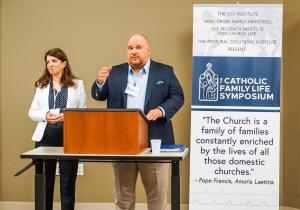
It’s easy to tell when someone is happy. People often express outward signs when they are feeling good, such as smiling, using an upbeat tone, or having a bounce in their step. But it can be harder to tell what someone is thinking when they are feeling down, tired, or upset. These emotions are often masked or do not come with as markedly definitive expressions. While you may think you know all of your partners’ “tell tale signs” of their emotions, new research suggests otherwise. Psychologist Chrystyna Kouros states “We found that when it comes to the normal ebb and flow of daily emotions, couples aren’t picking up on those occasional changes in ‘soft negative’ emotions like sadness or feeling down…They might be missing important emotional clues.” Because of this, there are a few things that we must keep in mind to maintain the connection in our relationships.
Theology of the Body reminds us that we were created for communion, but of course, sin ruptures that communion. Because of sin, instead of coming naturally to us, making connection to others takes effort. It requires us to be intentional about asking questions, scheduling dates, praying, reflecting and planning in order to create the kind of closeness and intimacy we were created to enjoy naturally. The sense that great relationships should “just happen” hints at the time before the fall, where Adam and Eve enjoyed Original Unity and it also hints at how things will be once we are united with God and the Communion of Saints in heaven. But here, in this sinful world, creating connection takes real work, and doing the work that is necessary to create loving communion–first, within our families and then in the world–is what it means to “build the kingdom.” Doing good works, serving in the parish or community, saving the world are all important things, but creating connection is the most important work a Christian can do. Remember what St. Paul said, “If I have the faith to move mountains, but have not love, I am nothing.” Let’s refocus on the great work of being intentional about creating meaningful connection with the people closest to us and let God multiply our efforts to bring the world to him through our efforts to consciously connect.
1. Don’t Assume–Too many couples assume that things are “fine” if there isn’t any conflict. They think that the lack of arguments is the same things as satisfaction. But there are a million reasons a couple might not be fighting that have nothing to do with intimacy. Don’t ever assume your marriage is on solid ground just because you’re not arguing. Instead, ask. Make time everyday to say to each other, “What can I do to make your day a little easier or more pleasant?” Make sure you get meaningful answers. Don’t settle for “I don’t know” or “Nothing.” If those are the answers you get more often than not, make a point of scheduling more focused conversations–at least weekly–about how close you feel to each other, what pressures you might feel are challenging your sense of togetherness, and what you might need to do to grow closer–even if things are good. Happy couples, don’t wait for conflict to tell them they are off-course, they regularly check their course and make tiny course corrections every day so they can make sure to stay on track
2. Give Your Connection to God–God wants you to have a great marriage, both because he wants to fill your hearts with his love AND because he wants to show the world–through your relationship–that the love that everyone longs for is truly possible. But God doesn’t expect us to create that kind of connection on our own. He wants to teach us, and he will, if we bring our relationship to him everyday. Take a few minutes every day to sit down together with your spouse and say to God, “Lord, we give you our relationship. Help us to love each other the way you want us to. Help us to really listen to each other, take care of each other, be honest about our needs, and be generous in our response to each other’s needs. Teach us to be a couple after your own heart, so that our hearts would be filled with your love and so that the world would see your life in us.” Let God teach you how to create and maintain a powerful, loving connection. Sit at The Master’s feet and learn to love each other with his love.
3. Connect Consciously–Most couples assume their relationship will “just happen” since they’re living under the same roof. But truly happy couples are conscientious about creating times to connect. Make a point of scheduling even 10 minutes every day to work, pray, talk and play together. Working together might mean setting the table together or cleaning up the kitchen together after dinner. Praying together just means bringing your day and your relationship to God and asking for his grace. Talking together means asking, NOT just about what happened in the day or what’s on the schedule tomorrow, but about how you’re feeling about the direction of your life and relationship and how you can better support each other. And playing together can be as simple as taking a 10 minute walk around the neighborhood, or playing a couple rounds of a favorite game. The point is, happy couples don’t assume relationship connection will “just happen.” They make mini-dates everyday to briefly maintain their ability to work, play, talk, and pray together, and then they look for bigger blocks of time to have more significant opportunities to connect across those levels as well. Being conscious about connecting daily, helps prevent you from feeling alone even though you’re always together.
For more on how to maintain the connection in your marriage, check out For Better…Forever! and tune in to More2Life—weekdays at 10am E/9am C on EWTN, SiriusXM 139.








